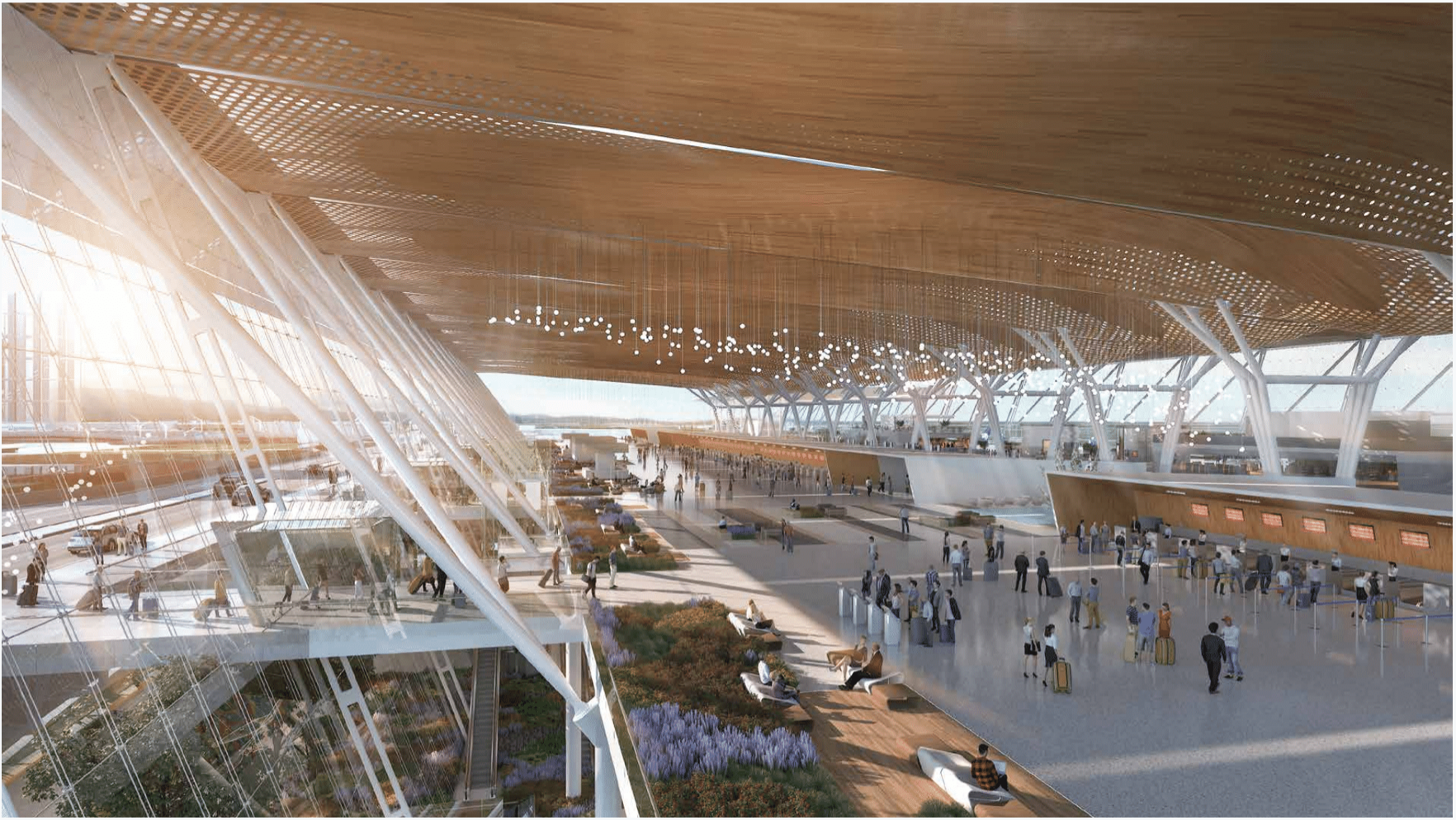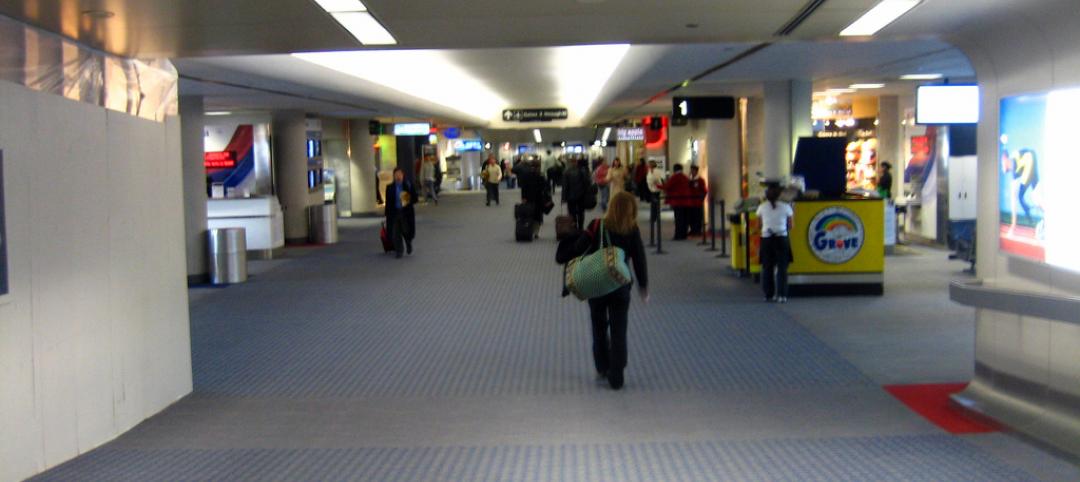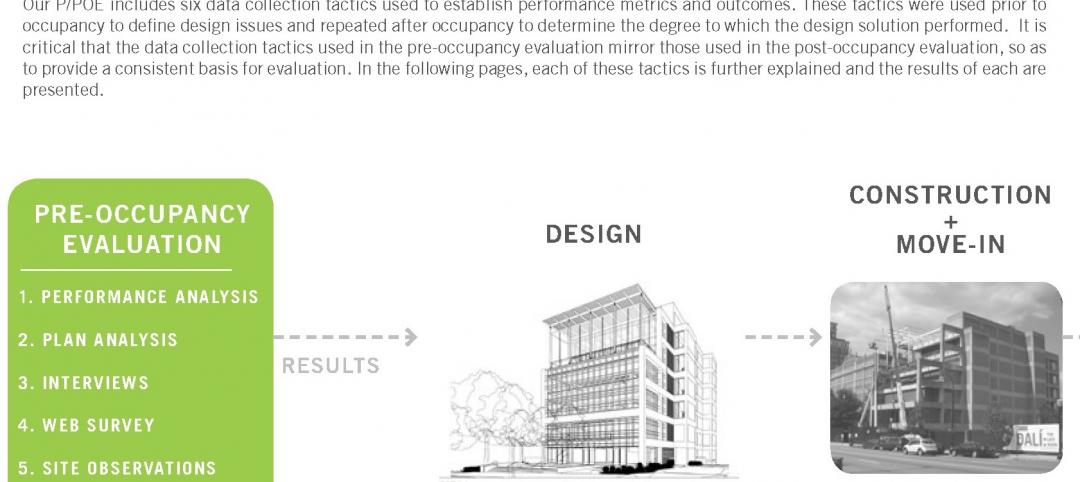Guadalajara Airport Terminal 2 will be a 30 gate, 1.2 million-sf terminal that places the passenger experience at the center of the design. It will also be one of the first net-zero airports in the world.
In order to reach this lofty goal, the terminal design includes research-backed, sustainable design strategies like solar energy harvest points, improved daylighting, insulation, glare control, shading, natural ventilation combined with economizer cooling, high performance mechanical systems, and building management systems. The design will reduce the airport’s energy use by 60% and its carbon footprint by over 90% – the proposed terminal would emit only 2,814 metric tons of CO2 each year. The facility will include landscaping that is continued from the exterior into the interior of the space.

The project, which is being designed from the ground up, will include biophilic plant features, a spa, a gym, prayer and meditation rooms, and local art. Local Mexican culture was a key design element for the project, with CallisonRTKL attempting to tell a tale of regionalism through a concept dubbed “The Soul of Guadalajara." Inspiration for the terminal design is rooted in the flight of the Mexican Eagle and features such as canyon-like ceilings and agave-inspired structural elements pay homage to the surrounding area.
Two local art galleries will also be included that showcase a variety of art from abstractions to interactive media. “It’s important to us that the airport reflects the culture of its destination from departures to arrivals,” said Liliana Bernardis, Senior Associate in CRTKL’s Mexico City office, in a release. “We want passengers to feel entrenched in local art and landscaping every step of the way.”



Related Stories
| Dec 8, 2014
Moshe Safdie wants to reinvent airports with Jewel Changi Airport addition
A new addition to Singapore's Changi Airport, designed by Moshe Safdie, will feature a waterfall and extensive indoor gardens.
| Nov 19, 2014
The evolution of airport design and construction [infographic]
Safety, consumer demand, and the new economics of flight are three of the major factors shaping how airlines and airport officials are approaching the need for upgrades and renovations, writes Skanska USA's MacAdam Glinn.
| Nov 18, 2014
Grimshaw releases newest designs for world’s largest airport
The airport is expected to serve 90 million passengers a year on the opening of the first phase, and more than 150 million annually after project completion in 2018.
| Nov 14, 2014
JetBlue opens Gensler-designed International Concourse at JFK
The 175,000-sf extension includes the conversion of three existing gates to international swing gates, and the addition of three new international swing gates.
Sponsored | | Nov 12, 2014
Eye-popping façade highlights renovation, addition at Chaffin Junior High School
The new distinctive main entrance accentuates the public face of the school with an aluminum tube “baguette” system.
| Oct 26, 2014
New York initiates design competition for upgrading LaGuardia, Kennedy airports
New York Gov. Andrew Cuomo said that the state would open design competitions to fix and upgrade New York City’s aging airports. But financing construction is still unsettled.
| Oct 16, 2014
Perkins+Will white paper examines alternatives to flame retardant building materials
The white paper includes a list of 193 flame retardants, including 29 discovered in building and household products, 50 found in the indoor environment, and 33 in human blood, milk, and tissues.
| Oct 12, 2014
AIA 2030 commitment: Five years on, are we any closer to net-zero?
This year marks the fifth anniversary of the American Institute of Architects’ effort to have architecture firms voluntarily pledge net-zero energy design for all their buildings by 2030.
| Sep 24, 2014
Architecture billings see continued strength, led by institutional sector
On the heels of recording its strongest pace of growth since 2007, there continues to be an increasing level of demand for design services signaled in the latest Architecture Billings Index.
| Sep 22, 2014
4 keys to effective post-occupancy evaluations
Perkins+Will's Janice Barnes covers the four steps that designers should take to create POEs that provide design direction and measure design effectiveness.
















